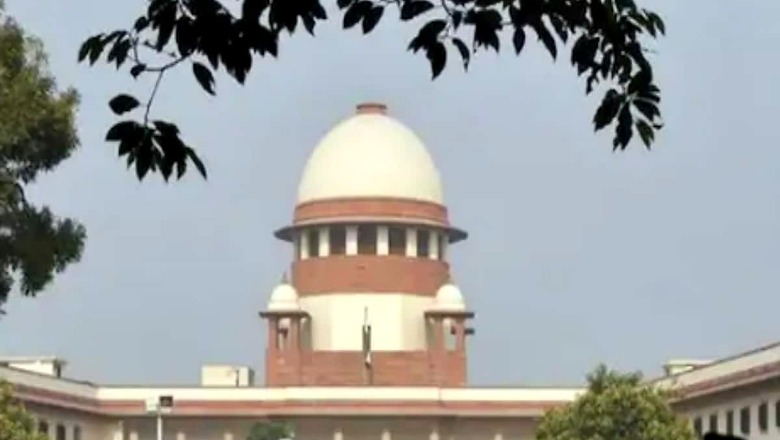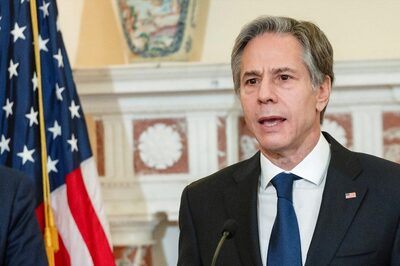
views
The Supreme Court Wednesday said that issues pertaining to 2018 Maharashtra law, granting reservation to Marathas in education and jobs, requires urgent hearing as the legislation has been stayed and the fruits accrued are not reaching to the people. The apex court had on September 9, while referring to a larger bench the batch of pleas challenging the validity of law, had stayed the implementation of the legislation but made it clear that status of those who have availed of the benefits would not be disturbed.
A five-judge constitution bench headed by Justice Ashok Bhushan Wednesday said it would hear the matter on a day-to-day basis from January 25 next year as it is necessary to complete the final hearing as early as possible looking into the issues raised and the consequences to be followed. This issue is required to be heard urgently as the effect of law has been stayed and fruits accrued are not reaching to the people. Therefore, this issue requires urgent hearing, observed the bench, also comprising Justices L Nageswara Rao, S Abdul Nazeer, Hemant Gupta and S Ravindra Bhat.
The top court also issued notice to Attorney General K K Venugopal seeking his assistance in the matter. We are of the view that looking into the issues raised in this appeal and the consequences to be followed, it is necessary that final hearing of this appeal be completed as early as possible, the bench said in its order.
One of the issues before this constitution bench being interpretation of Constitution (One Hundred Second Amendment) Act, 2018, let a notice be issued to the Attorney General for India, it said. Since the court is closing for winter vacation and after re-opening, the first two weeks are miscellaneous weeks, list this appeal along with other connected appeals for hearing on January 25, 2021. We make it clear that hearing in these appeals shall be on day-to-day basis, the bench said.
The Socially and Educationally Backward Classes (SEBC) Act, 2018 was enacted to grant reservation to people of Maratha community in Maharashtra in jobs and admissions. The Bombay High Court, while upholding the law in June 2019, had held that 16 per cent reservation was not justifiable and said that quota should not exceed 12 per cent in employment and 13 per cent in admissions. According to the 102nd amendment to the Constitution, reservation can be granted only if a particular community is named in the list prepared by the President. During the hearing conducted through video-conferencing on Wednesday, senior advocate Mukul Rohatgi, appearing for Maharashtra, said that the state has filed application for modification of the September 9 order.
This is not an intra-court appeal but application for vacation of stay based on some data, he said, adding that there is a question of law as to whether the five-judge bench should hear this or the bench which had referred the issue. This issue was decided that all interim orders will be dealt by larger bench, the bench observed.
Rohatgi said that challenge to EWS quota is pending before a bench-led by the Chief Justice of India but there is no stay. Is there any judgement which says the bench cannot pass interim orders while referring the matter, the bench asked Rohatgi, who responded there is no judgement. This is a matter where hundreds of judgements are cited. This cannot be argued in weekly hearing. Pass order on my application and list it for final hearing and we will argue after taking vaccine shots, Rohatgi said. Mr Rohatgi. you don’t need vaccine shots, the bench said in a lighter vein.
Senior advocate Kapil Sibal, appearing for one of the parties in the matter, said there are several states which have more than 50 per cent reservation. The apex court, while posting the case for hearing next month, permitted lawyers appearing for the parties in the matter to submit brief written submissions on or before January 18.
On July 27, the Maharashtra government had assured the top court that it would not proceed with the recruitment process to fill up the vacancies on the basis of 12 per cent Maratha reservation till September 15, except for departments, Public Health and Medical Education and Research.
The high court, in its June 27 last year order, had said that 50-per cent cap on total reservations imposed by the Supreme Court could be exceeded in exceptional circumstances. It had also accepted Maharashtra government’s argument that the Maratha community was socially and educationally backward and it was duty-bound to take steps for its progress.
The high court had said though the reservation was valid, its quantum — 16 per cent — was not justifiable and it should be reduced to 12 per cent and 13 per cent, as recommended by the State Backward Classes Commission. One of the plea filed in the apex court had claimed that the SEBC Act breached the 50 per cent ceiling on reservation fixed by the top court in its landmark judgment in the Indira Sahwney case, also known as the ‘Mandal verdict’.
On November 30, 2018, the Maharashtra legislature had passed a bill granting 16-per cent reservation to Marathas. The report submitted by the State Backward Classes Commission was based on quantifiable and contemporaneous data and was correct in classifying the Maratha community as socially and educationally backward, the high court had said in its verdict.
Read all the Latest News, Breaking News and Coronavirus News here

















Comments
0 comment